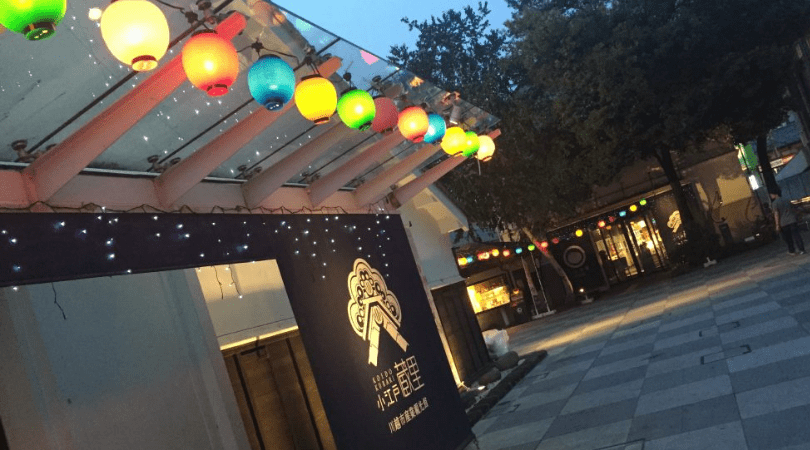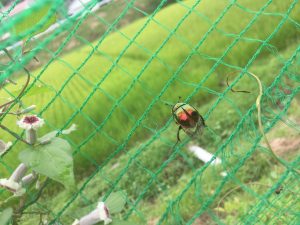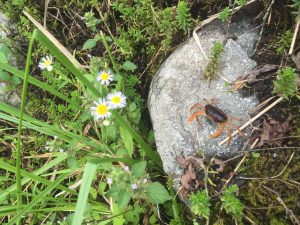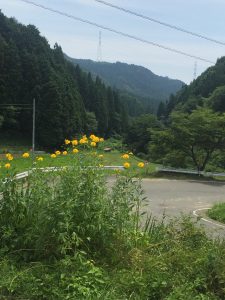It is nearly time for the Obon festival (お盆), or Festival of the Dead. Obon is a holiday season in Japan that began as a Buddhist tradition of honoring one’s family ancestors.
My husband and I do not practice Buddhist customs or believe in the spiritualism of Obon. However, the festival is a time of reunion, as it is one of the few times a year when family can take off time from work. This year, our aunt, uncle, and sister on Masashi’s side will travel to visit.

The holiday is observed during different times of the year depending on the region of Japan, so it falls around mid-July or mid-August. It is not an official government holiday, but most companies take off time during the festival. In the region where we live, Obon is observed from about August 11th-15th.
Traditionally, it was thought that during Obon, the spirits of ancestors would travel to this world to visit family members. While not everyone may still hold this belief, Obon is seen as a time for reuniting with family, respecting one’s ancestors, and visiting and cleaning the cemeteries where family members are memorialized.

It is at this time that, despite August being the hottest time of the year, the countryside is full of life.
Although the buzz of cicadas has begun to die down, there are sounds of construction, as workers rush to clear debris left from the recent rain. There are still broken stone walls, lumber, and mudslides to clear.
When Masashi drives out to town on errands, he is cautious as he makes his way around curving mountain roads, because often trucks are parked for convenience on blind curves near hillside cemeteries. Locals climb up the hillside to clean stone plaques and remove the leaves that have covered paths.
Less difficult to reach, a short walk up the hill behind our home reveals the family cemetery hidden between the bamboo and other foliage. Some of the stone monuments there are recent – including that of Masashi’s father Kaoru, who died when Masashi was eight years old. Closer to the house, there are stones that are so worn and ancient, we no longer know whom they commemorated.

Near the town, people hang lanterns to “guide the spirits” to their families – and for the sake of festivity. In the country, people hire gardeners to clear the brush and hack away at the weeds that have overtaken their property.
Neighbors armed with spray bottles and vacuums prepare for family visits, and plan meals to welcome their return.
It is not often that extended family journey home, so the summer occasion is one that brings excitement. Aged locals are lonely, and welcome the company.
Soon, locals will wear yukata (summer kimono), and pitch small outdoor markets with barbecues, dancing, and perhaps even drums. People in other areas of Japan might send floating lanterns down the river toward the end of Obon, or finish off the festivities with the bang of fireworks.
After Obon, temperatures will start to drop, the air pressure shift, and autumn will swiftly descend. Obon is like the “last hurrah” of summer, a time to savor the sun and wild greenery before the harvesting of rice.

Cleaning as we prepare for our family reunion makes me realize how far we’ve come in the months since we moved. While there are still plenty of projects left to complete, our house has a sense of “home”.
I’ve become acclimated to country life. My husband’s work is starting to flourish, and so are the flowers in the garden. We have met new people.
We are putting down roots, finding routine, and learning what it feels like to take things slow.
In about a week, many Japanese will pay their respects during the Festival of the Dead. Yet in addition to remembrance of the deceased, there is a pulse of life, too.
Families will be reunited, airports and highways will be full, and there will be music and food. When loved ones return to their hometowns and are welcomed with delicious meals, I hope they also have the chance to reflect on their roots. There is a beauty in being rooted, and in knowing where you came from, who you are, and where you are going.
And as the mercury in thermometers hovers high, and rice plants bend like waves in the wind, I feel that God is near.. and I know that we are rooted where, and in whom, we belong.
Does your family observe any summer celebrations, traditions, or reunions?
Please leave a comment below.
